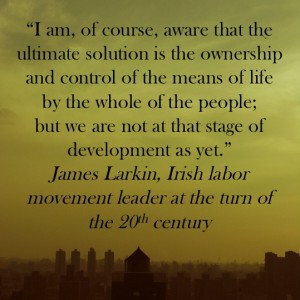A reprise of a 2011 post, still relevant today.
(Whispering.) Psst, excuse me, but actually it’s not ‘your’ program. And if you think that it is, we may have a problem on our hands.
A person’s word choice when describing their work or do-gooder endeavor can reveal quite a lot.
Some may think I’m just being fussy about semantics. They’ll argue that that well done is more important than well said. They’ll point to the fact that international aid, philanthropy, and social enterprise is constantly riddled with phrases and jargon that are eventually forgotten or rendered meaningless. But it’s deeper than that and I’m not talking acronyms.
I’m talking about possessive pronouns and adjectives.

Let’s be honest. How many of you, when talking to a friend, another NGO colleague, or donor refers to “our program” in [insert Country X or District Y or Community Z]?
But let me ask you something – Do you live in Country X or District Y or Community Z?
If you don’t, that should be your first clue that “my project” or “our program” is not the phrase for you to use. Here’s some others.
- When people from your community are knocking on your door for help and you are working day and night to help fulfill what they have identified as their needs, then yes, by all means, lay your claim.
- When you are coming up with the ideas and steps forward, based on a collective process to generate solutions to shared problems with your neighbors and fellow community members, then yes, “our project” is appropriate.
- When you are leading something and it’s not just a job or a hobby, it is a matter of life and personal responsibility to the people you face every day, go ahead, “our project” can be yours.
- When you can identify with the people you’re serving to such an extent that you feel an obligation to be directly accountable to them in a tangible rather than an abstract way, the program is truly “yours.”
Essentially, unless you’re on the ground, doing the work with and on behalf of your own community on a daily basis, I believe a program cannot and should not ever be considered “yours,” grammatically or otherwise. Without this awareness, “our project” can be dismissive and disrespectful to community activists and grassroots leaders, especially when the mutual accountability and trust are not there. (Oh, that never happens in the global development sector – not! Forgive the shameless 1990s U.S. slang reference.)
 Every person in our social good sector probably has their own pet peeves. These come and go as the lexicon shifts and changes with the latest development trend. There was a time near the turn of this century when I felt as if I had to discuss the definition of CABA (children affected by AIDS) then later OVC (orphans and vulnerable children) in one more stakeholder meeting, I would literally pitch a fit like a three-year-old.
Every person in our social good sector probably has their own pet peeves. These come and go as the lexicon shifts and changes with the latest development trend. There was a time near the turn of this century when I felt as if I had to discuss the definition of CABA (children affected by AIDS) then later OVC (orphans and vulnerable children) in one more stakeholder meeting, I would literally pitch a fit like a three-year-old.
But this “our project” issue for me has never left. When I was with [insert US-based, corporate aid agency here], though we claimed to work in partnership with local implementing organizations, all the programs were conceived of and spoken of as “ours.” This always struck me as extremely hypocritical, and frankly counter-productive to sound and proven principles of assets-based, community-driven development, let alone social transformation.
What made them our programs? The fact that we wrote the proposals? (Eh hum, in consultation with our partners of course – not!) Or were they our programs because, through our funding of local partners, we ultimately controlled how each cent was spent? Or because we were supposedly the ones who had to be accountable to USAID?
How is community ownership even possible under such circumstances? “Local” partners and communities didn’t have a chance to make the projects theirs. If a project is considered to be someone else’s, and your autonomy and sense of agency are clearly not on their radar, why would you even bother?
Similarly, I hear “our project” used just as egregiously by the DIY aid and social enterprise folks. How many times have I had to endure hearing all about “our project” from the do-gooder newly returned from Kenya at a cocktail party? As I nod and listen, I’m silently thinking to myself that the fact that this project is “yours,” will more than likely contribute to its downfall.
 Years of the Keystone INGO Partner Survey sends a clear message. Partners working at the national and local levels do not want to be treated as sub-contractors, carrying out international agencies’ projects and priorities. Rather they want help from donors to become independent and influential organizations in their own right, enabling them to respond flexibly to people’s needs.
Years of the Keystone INGO Partner Survey sends a clear message. Partners working at the national and local levels do not want to be treated as sub-contractors, carrying out international agencies’ projects and priorities. Rather they want help from donors to become independent and influential organizations in their own right, enabling them to respond flexibly to people’s needs.
When are we going to realize that participation is not just a nice-to-have in this work? Nor is it even enough.
To bring about real change, we need to be talking ownership.
And not our own.
***
Related Posts
Philanthropists, nonprofits need you to be brave
“They” and the shaping impulse of America
Does aid need a 12-step program?
Demonstrated: The demand for new narratives in international development communications

Pingback: Exploring Voluntourism | WISE - WASH in Southeast Asia